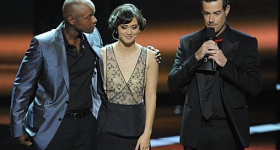Believe it or not, back in the nineties, when I was a big Lush fan, I had no idea that Miki Berenyi was mixed Asian. But I just had a nostalgia trip just now and downloaded Lush's last album, Lovelife, which I no longer have a copy of. And looking up info about the band, it finally occurred to me to ask myself why Berenyi looked like one of the people I typically blog about. According to Godipedia, it's because she's Japanese and Hungarian (though raised in the UK.)
I got my usual rush of endorphins when I found this out, which puzzles me. Would I have loved Lush more if I had known back then? That's a silly thought, but I have to admit: I probably would have. I remember how important it was to me when I found out that Keanu Reeves was mixed: I was sixteen and had just seen him in River's Edge and felt something familiar about him. He was the first "hapa" I ever encountered in pop culture (not counting David Carradine's character on Kung Fu) and he made me feel like my heretofore unique racial situation was attractive, interesting, and ... well, not unique.
Every pop culture figure I've encountered since then who is mixed Asian has added to that feeling, although I've been a real fan of few of them (excepting Annabella Lwin of Bow Wow Wow, and Hanif Kureishi, neither of whose backgrounds I knew when I became their fan.) And in the mid-nineties, when mixed Asians were still thin on the pop landscape, to discover that one of my favorite Brit Pop bands had a hapa lead singer would've made my year.
But why does it still matter to me? Aren't I over it yet? Or is there some sort of weird, digital-cultural tribalism that inevitably operates when it comes to hi-visibility arts? Is it really about "representation," whatever that means? Is it about presence, mere presence? Is it more important because other people see your public validation, or because they now know how to place you in context? Or is there some sort of magic to having your racial finger, so to speak, in the public pie?
What about you? Do you care more about a pop act if they are the same race, or ethnicity, as you? If so, how do you define your own "group"? How far outside of your immediate "tribe" do you go for pop validation? If not, do you see this kind of tribalism as stupid? Harmful? Why? Why not?
And what does all this have to do with Obama? (Just kidding ... I think.)
You can also use this space to squee about your favorite Asian American pop culture figures. Just don't insult anybody, swear, or generally be obnoxious or I will delete you.









Comments
There's nothing wrong with it, and I'm sure many feel the same way, especially for events like the Olympics.
95% of Black Americans voted for Obama. Politicians regularly speak at AIPAC events during campaigns to help get elected. Eminem and Justin Timberlake are popular in part because they do what Black artists do but are loved by white America. One justification for all the Whitewashing of Asian characters in movies is because white audiences supposedly spend more for white faces. The United States has sports teams like the Boston Celtics, the Fighting Irish, and universities like Howard or Brandeis. LGBT and feminist movements gained traction politically and in entertainment through their members voting and spending to support their identity interests. Whether it be democratic politics or market-driven entertainment images, Western societies are run by which tribes are strongest, which vote or spend as a bloc based on certain issues/values. The question should be, why do Asian Americans, as a pan-Asian group or even within ethnic groups, behave and identify less tribally or less ethnocentrically? Sung Kang once explained that execs found that there is no AA market - Asian Americans buy, vote, talk, dress, and act "like white people", with no increased demand to pay to see Asian American faces. The issues in terms of under-representation in media, distorted/demeaning images in media, as well as disproportionately low Asian American politicians (like in SF), are due in part because of us being "colorblind", or not voting/spending in a way that other minority groups do. This forces AA artists or politicians to pander primarily to non-Asian audiences to succeed. Our media images, and our politics, are currently dictated to us by other groups, because we aren't buying and spending in a way that creates a distinct Asian American voting bloc or marketing segment. The potential leverage/power is there, as Asian Americans already have as much purchasing power as African Americans, and in a decade will be a significant voting population.
Some of what Alvin said.
Really, it depends on the pop/media figure, as I think it should. I *heart* Arnel Pineda, and then again, I love rock and roll lead singers who are screaming tenors. I don't know how I feel about Manny Pacquiao, or rather, I have issues with the way mainstream USA media portrays him.
And also, doesn't it depend on the situation? When Lea Salonga had a major role in Miss Saigon, in which production Jonathon Pryce had the role of a Hapa character, while the API community was protesting this, Fil Am's were trying to support Salonga and getting criticized for doing so. So much for nationalism there.
Yes, I do. Though I feel a little silly about it, where musicians are concerned. Outside of rap, I guess, music isn't often "about" race or identity -- and when it is, it's often didactic and horrible to listen to. But still. I like Rachel Yamagata's music; I love her even a little more, feel she's even a little closer to singing my experience, b/c she's AsianAm too. I couldn't argue it or defend it rationally, but I'm not sure that means it's not true.
For me it is partly about having one of your own up there kickin' it amidst a sea of whiteness. But it's about more than just a common ethnicity, however. I feel a similar way when I see a black man succeeding in a field dominated by white folks, for example.
If popular culture was thick with Asian presence, I don't think I'd feel as excited to see one of us out there "representing".